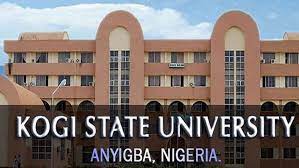Nestled in the heart of Anyigba, Kogi State, Nigeria, Kogi State University (KSU) stands as a beacon of education and progress.
Established in 1999 under the visionary leadership of Prince Abubakar Audu, then-governor of the state, KSU has steadily risen to prominence as a distinguished institution of higher learning.
In this post, I will explore the multifaceted aspects of KSU, from its diverse range of academic programs to its commitment to research and innovation, all while shedding light on the institution’s illustrious alumni and global engagement.
See Kogi State University: A Comprehensive Guide

A Multitude of Academic Opportunities
KSU prides itself on offering a comprehensive range of programs, both at the undergraduate and postgraduate levels, spanning various disciplines.
These programs encompass a wide spectrum, including but not limited to:
- Agriculture
- Arts and Humanities
- Business Administration
- Computer Science
- Education
- Engineering
- Environmental Sciences
- Law
- Medical Sciences
- Natural Sciences
- Social Sciences
This extensive diversity in academic offerings ensures that students can pursue their passions and interests while receiving a well-rounded education.
KSU’s commitment to providing such a broad spectrum of programs is a testament to its dedication to fostering holistic growth and development in its student body.
See KSU Departmental Cut Off Mark
A Vibrant Academic Community
With a thriving student population exceeding 50,000 and a dedicated staff of over 2,000, KSU thrives as a dynamic academic community.
The institution’s commitment to nurturing talent and fostering intellectual growth is palpable in its robust academic offerings and its reputation for academic excellence.
KSU values each student as a unique individual, providing an environment where diverse talents and perspectives can flourish.
This inclusive approach to education not only prepares students for their careers but also instills in them a sense of responsibility and citizenship, equipping them to contribute meaningfully to the progress of Nigeria.
A Hub for Research and Innovation
KSU doesn’t limit its mission to teaching alone; it also dedicates itself to research and innovation.
The university boasts several world-class research centers and institutes, including but not limited to:
- Center for Agriculture and Rural Development
- Center for Environmental Studies
- Center for Peace and Conflict Resolution
KSU’s researchers are at the forefront of their respective fields, actively contributing to the body of knowledge through extensive publications in peer-reviewed journals and the acquisition of grants for groundbreaking research projects.
This unwavering commitment to research positions KSU as a hub for innovation and knowledge creation, significantly impacting not only the institution but also the nation’s development.
Proud Alumni: Shaping Nigeria’s Future
KSU takes immense pride in its alumni, many of whom have gone on to make significant contributions to Nigerian society.
Some of the distinguished individuals who have walked the halls of KSU include:
- Yahaya Bello: The current governor of Kogi State.
- Smart Adeyemi: A prominent Nigerian senator.
- Dino Melaye: A well-known Nigerian senator.
- James Faleke: A respected Nigerian politician.
- Attahiru Jega: A renowned Nigerian academic and former chairman of the Independent National Electoral Commission (INEC).
These notable alumni stand as living testaments to the quality education and leadership development fostered by KSU.
Their accomplishments serve as an inspiration to current and future students, reinforcing the institution’s commitment to producing outstanding individuals who shape Nigeria’s future.
Global Engagement: A Commitment to Excellence
KSU’s commitment to excellence extends beyond its borders.
The university is a proud member of the Association of Commonwealth Universities and maintains accreditation from the National Universities Commission.
Additionally, it has received accreditation from the National Accreditation Board, further solidifying its commitment to adhering to both national and international standards of academic quality.
In Summary, Kogi State University (KSU) is a thriving and dynamic institution that remains steadfast in its dedication to providing a world-class education to its students.
Through its unwavering commitment to research, innovation, and the development of Nigeria, KSU continues to play a significant role in shaping the future of the nation.
See KSU Post UTME Cut Off Mark For All Departments
Tuition Fees: Affordability and Accessibility
Understanding the financial aspect of education is essential. KSU’s tuition fees are structured to be accessible to a wide range of students, with fees categorized based on the student’s level and residency status (indigene or non-indigene of Kogi State).
Here’s a breakdown of the tuition fees:
Indigene Students:
- 100 Level: N50,000
- 200 Level: N50,000
- 300 Level: N50,000
- 400 Level: N50,000
- 500 Level (if applicable): N50,000
Non-Indigene Students:
- 100 Level: N65,000
- 200 Level: N65,000
- 300 Level: N65,000
- 400 Level: N65,000
- 500 Level (if applicable): N65,000
In addition to tuition fees, students are also required to pay various other fees to support the overall educational experience. These fees include:
- Acceptance Fee: N35,000
- Medical Examination Fee: N2,500
- ICT Fee: N7,500
- Library Fee: N5,000
- Examination Fee: N10,000
- Sports Fee: N5,000
- Student Union Fee: N5,000
To calculate the total fees for each category of students (indigene and non-indigene), simply add the respective tuition fee to the sum of all additional fees. For example:
Total Fees for 100 Level Indigene Students: N50,000 (tuition) + N35,000 (Acceptance) + N2,500 (Medical Exam) + N7,500 (ICT) + N5,000 (Library) + N10,000 (Examination) + N5,000 (Sports) + N5,000 (Student Union) = N105,000.
Total Fees for 100 Level Non-Indigene Students: N65,000 (tuition) + N35,000 (Acceptance) + N2,500 (Medical Exam) + N7,500 (ICT) + N5,000 (Library) + N10,000 (Examination) + N5,000 (Sports) + N5,000 (Student Union) = N120,000.
Please note that these fees are subject to change, and it is advisable to verify the most up-to-date information with the KSU Bursary Department to ensure accurate financial planning for the academic session.
KSU’s commitment to providing accessible and affordable education underscores its dedication to empowering the next generation of leaders, thinkers, and innovators.
See JAMB CBT Centers Approved for Registration in Kogi State
KSU school fees structure
here’s the school fees structure for Kogi State University (KSU) in a tabular form:
Tuition Fees:
| Level | Indigene Students (N) | Non-Indigene Students (N) |
|---|---|---|
| 100 Level | 50,000 | 65,000 |
| 200 Level | 50,000 | 65,000 |
| 300 Level | 50,000 | 65,000 |
| 400 Level | 50,000 | 65,000 |
| 500 Level (if applicable) | 50,000 | 65,000 |
Additional Fees:
| Fee | Amount (N) |
|---|---|
| Acceptance Fee | 35,000 |
| Medical Examination Fee | 2,500 |
| ICT Fee | 7,500 |
| Library Fee | 5,000 |
| Examination Fee | 10,000 |
| Sports Fee | 5,000 |
| Student Union Fee | 5,000 |
Total Fees:
- Total Fees for Indigene Students: For each level, indigene students pay N50,000 (tuition) + sum of additional fees.
- For example, for 100 Level: N50,000 (tuition) + N35,000 (Acceptance) + N2,500 (Medical Exam) + N7,500 (ICT) + N5,000 (Library) + N10,000 (Examination) + N5,000 (Sports) + N5,000 (Student Union) = N105,000.
- Total Fees for Non-Indigene Students: For each level, non-indigene students pay N65,000 (tuition) + sum of additional fees.
- For example, for 100 Level: N65,000 (tuition) + N35,000 (Acceptance) + N2,500 (Medical Exam) + N7,500 (ICT) + N5,000 (Library) + N10,000 (Examination) + N5,000 (Sports) + N5,000 (Student Union) = N120,000.
Important Note: These fees are subject to change, and it’s advisable to verify the most up-to-date information with the KSU Bursary Department to ensure accurate financial planning for the academic session.
In summary, KSU’s school fees structure is designed to accommodate students’ varying levels and residency status, with additional fees contributing to the comprehensive educational experience provided by the university.
See KSU Student Portal | Login into the KSU Student Portal
Conclusion
Kogi State University (KSU) stands as a reputable institution committed to providing quality education to students in Nigeria.
The university’s school fees structure reflects its consideration for the diverse backgrounds of its students, offering different rates for indigene and non-indigene students at various academic levels.
Moreover, while tuition fees are a part of the cost, additional fees ensure a comprehensive educational experience.
It’s important to note that these fees may change over time, and students are advised to consult the KSU Bursary Department for the latest information.
KSU’s dedication to both accessibility and excellence underscores its role in contributing to the educational and intellectual development of the nation.
SEE ALSO OTHER TOPICS:
University of Ilesa School Fees
Enugu State University of Medical and Applied Sciences School Fees
Shehu Shagari University of Education Sokoto School Fees

Hello, I’m Prince, a versatile creator in the world of the web. As an article writer, I weave words into compelling stories and informative pieces that engage and inform. Simultaneously, I’m a web developer, crafting digital experiences that come to life on the internet. With a passion for both writing and coding, I thrive on combining creativity and technology to bring ideas to fruition. Join me as we explore the limitless possibilities of the digital realm.





